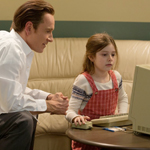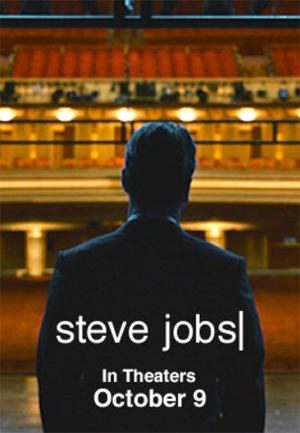 Looking back through my notebook I discovered that I wrote most of a review of STEVE JOBS back when it was in theaters, but I never typed it up. I guess since it wasn’t nominated for best picture I didn’t catch that when I was doing all the pre-Oscars reviews. But I think it’s a movie worthy of more attention than it got, and it’s available on video and I use a Mac so it seems only fair to finish it.
Looking back through my notebook I discovered that I wrote most of a review of STEVE JOBS back when it was in theaters, but I never typed it up. I guess since it wasn’t nominated for best picture I didn’t catch that when I was doing all the pre-Oscars reviews. But I think it’s a movie worthy of more attention than it got, and it’s available on video and I use a Mac so it seems only fair to finish it.
Steve Jobs was a genius and also an asshole. That’s kinda the basics of Aaron Sorkin’s screenplay, and many of his other screenplays, and therefore I have to guess something he can relate to. Like his other computer history piece THE SOCIAL NETWORK I think this one leans in the direction of genius not justifying assholishness, but it seems to be a question he struggles with.
I’m a little – not alot – familiar with the playwright turned TV mastermind’s work. I know people who adore his shows Sports Night and The West Wing, and some who are masochistically fascinated with The Newsroom.
Actually the only of his shows I’ve watched in its entirety was Studio 60 On the Sunset Strip, which did have plenty of good character drama and cleverness, but my interest was in its overblown pontificating about the brilliance and importance of the fictional sketch comedy show that we can’t help but notice, in the bits of it we see, is objectively, painfully, not even remotely fucking close to being at all even slightly funny. The show mused on the culture-shifting possibilities of a comedy genius with conservative politics, portrayed as completely humorless by Sarah Paulson (who these days is having better luck playing Marcia Clark on The People vs. O.J. Simpson, my current favorite character on television). One particularly befuddling episode hinged on the bizarrely out of touch premise that people outside of the comedy profession (and specifically the parents of this cast) have never heard of the “Who’s On First?” routine.
 STEVE JOBS, thankfully, avoids such cluelessness. While THE SOCIAL NETWORK chronicled the creation of a major technological phenomenon, this one’s actually closer to those behind-the-scenes-on-a-TV-show shows. Rather than the cradle-to-grave or even short-period-as-microcosm-of-a-life biopic you’d expect, Sorkin takes the theatrical approach of writing only three real time scenes, each taking place backstage in the half hour or so before one of those product launch shindigs that Jobs was famous for. 1984, 1988, and 1998. A brief tour through the evolution of ugly fashions, boxy gadgets and many personal and professional relationships.
STEVE JOBS, thankfully, avoids such cluelessness. While THE SOCIAL NETWORK chronicled the creation of a major technological phenomenon, this one’s actually closer to those behind-the-scenes-on-a-TV-show shows. Rather than the cradle-to-grave or even short-period-as-microcosm-of-a-life biopic you’d expect, Sorkin takes the theatrical approach of writing only three real time scenes, each taking place backstage in the half hour or so before one of those product launch shindigs that Jobs was famous for. 1984, 1988, and 1998. A brief tour through the evolution of ugly fashions, boxy gadgets and many personal and professional relationships.
As Sorkin would admit, his script is all true, but also all bullshit. It’s a series of confrontations between Jobs (Michael Fassbender, JONAH HEX) and a group of real people in his life. Fictional confrontations, but all based on real stuff that was going on in his life.
You can tell Sorkin researched the shit out of it and then probly researched research on the research. As in all of his work, everybody talks ten miles a half a minute and there’s a ton of details packed in there. Stories about his objection to a magazine cover, the importance of having the computer speak the word “hello” to the audience, even if he has to fake it, his reaction to his daughter testing out MacPaint, clashes over the politics of publicly thanking people for their work, philosophical arguments about whether or not he actually does anything. He’s not actually a guy who can build or program a computer, he just has the ideas. He compares himself to a conductor. If he was cooler he’d say he was like George Clinton.
Sorkin is interested in the procedure of technological revolution, but not necessarily the products. The technology itself isn’t that important. They don’t even mention that Casey Ryback used a Newton to write his memoirs, Ryback’s Tactics, in UNDER SIEGE 2: DARK TERRITORY. The last scene takes place years before iPods and iPhones, which we remember because of his daughter’s Walkman. Rather than being about “this man changed our lives with these little boxes!” it’s about the philosophical differences he has with Steve Wozniak (Seth Rogen), his old friend who he started Apple with. Woz (as they call him, a reference to The Boz in my opinion) believes computers should be customizable and open, while Jobs is introducing computers that you can’t even open without special tools (and they forgot to have one at the launch and need to fix the fucking thing!). Also Woz believes you can be nice to people and Jobs thinks you have to be a dick to get things done right.
Maybe the main thread of the movie, the one that makes it hard to really like Jobs, is his relationship with his ex (Katherine Waterston, INHERENT VICE) and his daughter (Makenzie Moss, Ripley Sobo, Perla Haney-Jardine), who he claims is not his and is a dick to, even though she calls him “dad” and seems smart and sweet. Her mom has to shame him into giving them money, an upsetting and humiliating experience. His attitude changes toward her across the three chapters, but the movie seems a little overly proud of him considering the small amount of progress we see him make. It’s kinda sweet but I felt almost like it was trying to trick me into forgiving him. He makes one major gesture and the music (score by Daniel Pemberton, THE COUNSELOR) wants to tell us he’s absolved. In interviews it sounds like Sorkin does not consider their relationship resolved at the end, but director Danny Boyle’s filmatism seems to disagree.
By the way, the older version of his daughter is Bebe from KILL BILL VOLUME 2.
Fassbender (THE COUNSELOR) is deceptively good as Jobs. It seems pretty effortless until you think about how different this dorky visionary fast-talking brow-beater is from other characters he’s played. One funny part though is that there’s a good script reason for him to take off his shirt and it reveals that he’s much more buff than we would imagine the real Jobs was under that turtleneck. Otherwise he does a good job of looking gawky.
Rogen follows in two-time-Academy-Award-nominee-SUPERBAD-star Jonah Hill’s footsteps by working well in a dramatic role that’s mostly just like one of his comedy performances, but in a different context. Michael Stuhlbarg as a tech who gets stepped on by Jobs and has to stand up to him is a bigger transformation. He kinda looks like River Phoenix at first.
The best part of the movie by far is Kate Winslet as Joanna Hoffman, Jobs’s right hand woman or “work wife” who knows how to navigate through all the types of shit he’s gonna throw and seems to do the best at getting through to his human side and demanding a standard of decency in his behavior, especially in dealing with his daughter. The real Hoffman was born in Poland, raised in the Soviet Union with an Armenian mother and then moved to New York when she was 12, so Winslet does quite an accent. She’s an impressive character because she’s the assistant, she’s not supposed to be the center of the movie, but she is. Much as Jobs conducts his orchestra she seems to conduct him, trying to point his moods and inspiration in the right direction, and then course correcting when it doesn’t work. I’ve always liked Winslet as much as the next guy, but this is something else. This was a well deserved best supporting actress nomination, not just one of those “well, she won one before, and I can’t think of anybody else” type deals.
THE SOCIAL NETWORK’s David Fincher at one time was attached to direct, with Christian Bale starring. That didn’t happen, in my opinion. Instead it’s Boyle (SUNSHINE), who doesn’t have Fincher’s searing filmatistic precision, but certainly does well with the material. To me it seems like Sorkin’s baby, with Boyle skillfully mounting a production of his play, putting faces and mouths and scenery to a movie made up mostly of words. The script is the skeleton and the skin.
There is absolutely no mistaking that Sorkin wrote this. It’s spontaneously eloquent, hyper-intelligent people in intense conversations, volleying quips and parables and references at each other two-handed like Chow Yun Fat sliding down a banister. Nobody talks like this, or I’m not smart enough to be around people who talk like this, and that’s okay. I liked this play.


























March 21st, 2016 at 3:56 pm
“It’s spontaneously eloquent, hyper-intelligent people in intense conversations, volleying quips and parables and references at each other two-handed like Chow Yun Fat sliding down a banister.”
DAMN that’s good. I wish I could inhale that sentence and savor its high like a Wall St. coke fiend and his favorite cut of el oro blanco.